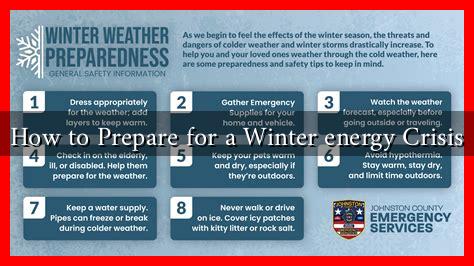-
Table of Contents
- How to Prepare for a Winter Energy Crisis
- Understanding the Risks of a Winter Energy Crisis
- Steps to Prepare for a Winter Energy Crisis
- 1. Conduct an Energy Audit
- 2. Stockpile Essential Supplies
- 3. Explore Alternative Heating Options
- 4. Stay Informed and Connected
- Case Studies: Lessons from Past Winter Energy Crises
- Conclusion
How to Prepare for a Winter Energy Crisis
As winter approaches, the potential for an energy crisis looms larger, especially in regions that experience extreme cold. The combination of increased energy demand for heating and potential supply disruptions can lead to significant challenges for households and businesses alike. Preparing for a winter energy crisis is not just about stockpiling resources; it involves strategic planning and proactive measures. This article outlines essential steps to ensure you are ready for the winter months ahead.
Understanding the Risks of a Winter Energy Crisis
Winter energy crises can arise from various factors, including:
- Increased Demand: As temperatures drop, the demand for heating rises, often leading to spikes in energy prices.
- Supply Disruptions: Severe weather events, such as snowstorms or ice storms, can disrupt energy supply chains.
- Infrastructure Challenges: Aging energy infrastructure may struggle to meet increased demand during peak winter months.
- Geopolitical Factors: Global events can impact energy supply, particularly for regions reliant on imported fuels.
According to the U.S. Energy Information Administration (EIA), residential energy consumption typically increases by 20-30% during winter months, highlighting the importance of preparedness.
Steps to Prepare for a Winter Energy Crisis
Preparation is key to mitigating the impacts of a winter energy crisis. Here are several strategies to consider:
1. Conduct an Energy Audit
Understanding your energy consumption is the first step in preparation. An energy audit can help identify areas where you can improve efficiency. Consider the following:
- Check insulation levels in your home.
- Inspect windows and doors for drafts.
- Evaluate heating systems for efficiency.
Many utility companies offer free or discounted energy audits, making this an accessible option for homeowners.
2. Stockpile Essential Supplies
In the event of an energy crisis, having essential supplies on hand can make a significant difference. Consider stocking up on:
- Non-perishable food items.
- Bottled water.
- Blankets and warm clothing.
- Flashlights and batteries.
- Portable chargers for electronic devices.
Having these supplies ready can help you weather a crisis more comfortably.
3. Explore Alternative Heating Options
In case of power outages or fuel shortages, having alternative heating sources can be invaluable. Options include:
- Wood or pellet stoves.
- Propane heaters (ensure proper ventilation).
- Electric space heaters (use with caution).
Always prioritize safety when using alternative heating methods to prevent carbon monoxide poisoning or fire hazards.
4. Stay Informed and Connected
Being aware of weather forecasts and energy supply updates is crucial. Here are some ways to stay informed:
- Sign up for local alerts from your utility company.
- Follow weather updates through reliable news sources.
- Join community groups focused on energy conservation and crisis preparedness.
Staying connected with your community can also provide support and resources during a crisis.
Case Studies: Lessons from Past Winter Energy Crises
Examining past winter energy crises can provide valuable insights. For instance, the 2021 Texas winter storm led to widespread power outages, affecting millions. The crisis highlighted the importance of:
- Investing in resilient infrastructure.
- Implementing demand response programs.
- Encouraging energy conservation among consumers.
These lessons can guide future preparations and policy decisions to prevent similar crises.
Conclusion
Preparing for a winter energy crisis requires foresight, planning, and community engagement. By conducting energy audits, stockpiling essential supplies, exploring alternative heating options, and staying informed, individuals and families can significantly reduce the impact of potential energy shortages. As we face the uncertainties of winter, proactive measures can ensure safety and comfort during the cold months ahead. For more information on energy conservation and crisis preparedness, visit the U.S. Department of Energy.

